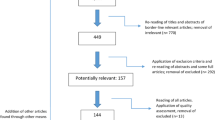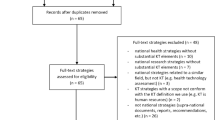Abstract
Objectives
To review and describe available Knowledge Translation (KT) strategies that are designed for or applied in public health decision-making settings.
Introduction
KT is the exchange, synthesis, and ethically sound application of knowledge. This review proposes that KT strategies in public health settings should be understood as action plans that promote evidence use and facilitate evidence-informed decision-making.
Methods
This scoping review included studies that reported on KT strategies applied in public health settings, published between 2010 and 2017. Studies were searched using Medline, online KT database, and citation tracing. Data from 305 included studies were synthesized using a coding form and conceptually mapped to identify KT strategies used in public health settings.
Results
A total of 124 unique examples of KT methods or tools were identified and summarized into 38 recommended and promising KT strategies. Built on the lists of recommended strategies, this review synthesized a framework that matched all 38 KT strategies to 10 key components of the evidence-informed decision-making process.
Conclusions
The public health KT strategies summarized and organized by this review promote a better understanding and more effective use of KT strategies.

Similar content being viewed by others
References
Armstrong R, Waters E, Dobbins M, Lavis JN, Petticrew M, Christensen R (2011) Knowledge translation strategies for facilitating evidence‐informed public health decision making among managers and policy‐makers. Cochrane Database of Systematic Reviews
Babbie ER (1998) The practice of social research, vol 112. Wadsworth Publishing Company, Belmont
Bailey J, Mann S, Wayal S, Hunter R, Free C, Abraham C, Murray E (2015) Scoping review methodology. In: Sexual health promotion for young people delivered via digital media: a scoping review. NIHR Journals Library
Bowen S, Zwi AB (2005) Pathways to “evidence-informed” policy and practice: a framework for action. PLoS Med 2:e166
Cihr C (2004) Knowledge translation strategy 2004–2009: innovation in action. Canadian Institutes of Health Research, Ottawa
Ciliska D, Thomas H, Buffett C (2008a) A compendium of critical appraisal tools for public health practice links
Ciliska D, Thomas H, Buffett C (2008b) An introduction to evidence-informed public health and a compendium of critical appraisal tools for public health practice. National Collaborating Centre for Methods and Tools, Ontario
Colquhoun H, Leeman J, Michie S et al (2014) Towards a common terminology: a simplified framework of interventions to promote and integrate evidence into health practices, systems, and policies. Implement Sci 9:781
Cooke A, Smith D, Booth A (2012) Beyond PICO: the SPIDER tool for qualitative evidence synthesis. Qual Health Res 22:1435–1443
Davis D, Davis ME, Jadad A et al (2003) The case for knowledge translation: shortening the journey from evidence to effect. BMJ 327:33–35
Dixon-Woods M, Cavers D, Agarwal S et al (2006) Conducting a critical interpretive synthesis of the literature on access to healthcare by vulnerable groups. BMC Med Res Methodol 6:1–13
Field B, Booth A, Ilott I, Gerrish K (2014) Using the knowledge to action framework in practice: a citation analysis and systematic review. Implement Sci 9:172
Glasgow RE, Lichtenstein E, Marcus AC (2003) Why don’t we see more translation of health promotion research to practice? Rethinking the efficacy-to-effectiveness transition. Am J Public Health 93:1261–1267
Golafshani N (2003) Understanding reliability and validity in qualitative research. Qual Rep 8:597–606
Graham ID, Logan J, Harrison MB, Straus SE, Tetroe J, Caswell W, Robinson N (2006) Lost in knowledge translation: time for a map? J Contin Educ Health Prof 26:13–24
Grol R, Grimshaw J (2003) From best evidence to best practice: effective implementation of change in patients’ care. Lancet 362:1225–1230
Grol R, Jones R (2000) Twenty years of implementation research. Fam Pract 17:S32–S35
Jacobs JA, Jones E, Gabella BA, Spring B, Brownson RC (2012) Peer reviewed: tools for implementing an evidence-based approach in public health practice. Preventing chronic disease 9
Jacobson N, Butterill D, Goering P (2003) Development of a framework for knowledge translation: understanding user context. J Health Serv Res Policy 8:94–99
LaRocca R, Yost J, Dobbins M, Ciliska D, Butt M (2012) The effectiveness of knowledge translation strategies used in public health: a systematic review. BMC Public Health 12:751. https://doi.org/10.1186/1471-2458-12-751
Malla C, Aylward P, Ward P (2018) Knowledge translation for public health in low-and middle-income countries: a critical interpretive synthesis. Glob Health Res Policy 3:1–12
McKibbon KA, Lokker C, Wilczynski NL et al (2010) A cross-sectional study of the number and frequency of terms used to refer to knowledge translation in a body of health literature in 2006: a Tower of Babel? Implement Sci 5:16
McKibbon KA, Lokker C, Keepanasseril A, Colquhoun H, Haynes RB, Wilczynski NL (2013) WhatisKT wiki: a case study of a platform for knowledge translation terms and definitions—descriptive analysis Implementation. Science 8:13
Methley AM, Campbell S, Chew-Graham C, McNally R, Cheraghi-Sohi S (2014) PICO, PICOS and SPIDER: a comparison study of specificity and sensitivity in three search tools for qualitative systematic reviews. BMC Health Serv Res 14:579
Munn Z, Peters MD, Stern C, Tufanaru C, McArthur A, Aromataris E (2018) Systematic review or scoping review? Guidance for authors when choosing between a systematic or scoping review approach. BMC Med Res Methodol 18:143
Nutbeam D (1986) Health promotion glossary. Health Promot Int 1(1):113–127
Rogers JD, Martin FH, Force NKTT (2009) Knowledge translation in disability and rehabilitation research: lessons from the application of knowledge value mapping to the case of accessible currency. J Disabil Policy Stud 20:110–126
Rychetnik L, Hawe P, Waters E, et al (2004) A glossary for evidence based public health. J Epidemiol Community Health 58:538–545
Smith BJ, Tang KC, Nutbeam D (2006) WHO health promotion glossary: new terms. Health Promot Int 21:340–345
Strifler L, Cardoso R, McGowan J et al (2018) Scoping review identifies significant number of knowledge translation theories, models, and frameworks with limited use. J Clin Epidemiol 100:92–102
Tricco AC, Lillie E, Zarin W et al (2018) PRISMA extension for scoping reviews (PRISMA-ScR): checklist and explanation. Ann Internal Med 169:467–473
Acknowledgements
The authors thank Zhuxuan Fu and Jian Shi for serving as second screener for some of the articles.
Author information
Authors and Affiliations
Contributions
N.Z., S.K.W., A.L., and M.C. contributed to study concept and design. N.Z. finalized the search strategy and completed data acquisition and cleaning. N.Z. and M.C. interpreted the data. N.Z. drafted the manuscript. S.K.W., A.L., and M.C. provided valuable input and revised the manuscript. M.C. provided funding for research assistants’ time. All authors read and approved the final manuscript.
Corresponding author
Ethics declarations
Conflict of interest
None.
Financial support
This work was completed as part of N.Z.’s DrPH dissertation, which received stipend support from the Department of Public Health and Community Medicine, at Tufts University School of Medicine.
Additional information
Publisher's Note
Springer Nature remains neutral with regard to jurisdictional claims in published maps and institutional affiliations.
This article is part of the section “Knowledge synthesis, translation and exchange.”
Electronic supplementary material
Below is the link to the electronic supplementary material.
Rights and permissions
About this article
Cite this article
Zhao, N., Koch-Weser, S., Lischko, A. et al. Knowledge translation strategies designed for public health decision-making settings: a scoping review. Int J Public Health 65, 1571–1580 (2020). https://doi.org/10.1007/s00038-020-01506-z
Received:
Revised:
Accepted:
Published:
Issue Date:
DOI: https://doi.org/10.1007/s00038-020-01506-z




